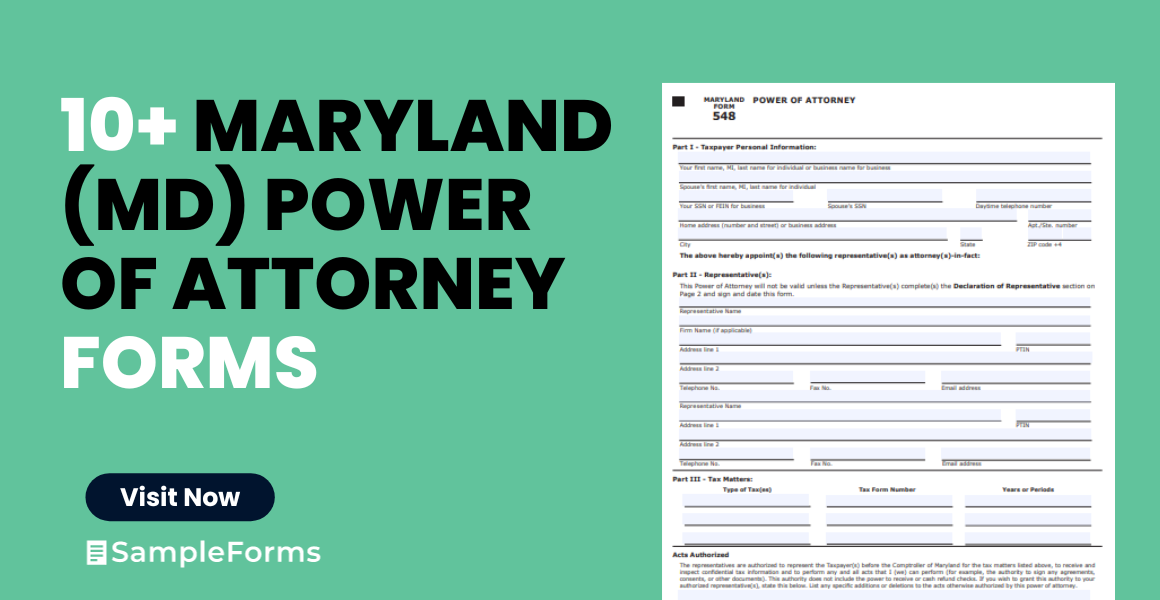Unlock the potential of Maryland Power of Attorney (POA) forms with our comprehensive guide. Learn the essentials of selecting, filling out, and effectively using a POA in Maryland. Our expert tips ensure you navigate this legal tool with confidence, whether for financial, healthcare, or general purposes. Stay informed about Maryland’s specific POA requirements and empower yourself or loved ones with the right knowledge. Begin your journey towards secure and efficient legal decision-making in Maryland today.
What is the Maryland Power of Attorney Form?
The Maryland Power of Attorney Form is a legal document that allows you to appoint someone else to make decisions on your behalf. This can include managing your finances, property, or making healthcare decisions if you’re unable to do so yourself. In Maryland, this form must meet specific state requirements to be valid. It’s a crucial tool for planning ahead and ensuring your affairs are handled according to your wishes.
What is the Best Sample Maryland Power of Attorney Form?
A Maryland Power of Attorney (POA) form is a legal document that allows an individual (the “Principal”) to designate another person (the “Agent”) to make decisions and act on their behalf. This document is essential for various situations, such as financial management, healthcare decisions, and other personal matters.
Maryland Power of Attorney Form
Part 1: Principal Information
- Principal’s Full Name: ________________________________
- Principal’s Address: ________________________________
- Principal’s Contact Number: _________________________
Part 2: Agent Information
- Agent’s Full Name: ________________________________
- Agent’s Address: ________________________________
- Agent’s Contact Number: _________________________
Part 3: Powers Granted
- Financial Decisions: [ ] Yes [ ] No
- Real Estate Transactions: [ ] Yes [ ] No
- Personal and Family Maintenance: [ ] Yes [ ] No
- Business Operations: [ ] Yes [ ] No
- Insurance and Annuity Transactions: [ ] Yes [ ] No
- Estate, Trust, and Beneficiary Transactions: [ ] Yes [ ] No
- Claims and Litigation: [ ] Yes [ ] No
- Healthcare Decisions (including end-of-life care): [ ] Yes [ ] No
- Other (specify): ________________________________
Part 4: Duration of Power of Attorney
- Effective Date: ________________________________
- Termination Date (if applicable): __________________
- Durable (remains in effect if the Principal becomes incapacitated): [ ] Yes [ ] No
Part 5: Signatures
- Principal’s Signature: _________________________
- Date: ___________________
- Agent’s Signature: _________________________
- Date: ___________________
- Witness 1 Signature: _________________________
- Date: ___________________
- Witness 2 Signature: _________________________
- Date: ___________________
Part 6: Notarization
This document was acknowledged before me on (date) ____________ by (Principal’s name) _______________________.
Notary Public’s Signature: ________________________________ My commission expires on: ________________________________
This Maryland Power of Attorney Form is a comprehensive template designed to cover various aspects of delegating authority. It is vital to review and complete the form carefully to ensure it aligns with the specific needs and legal requirements of the state of Maryland.
1. State of Maryland Power of Attorney Form
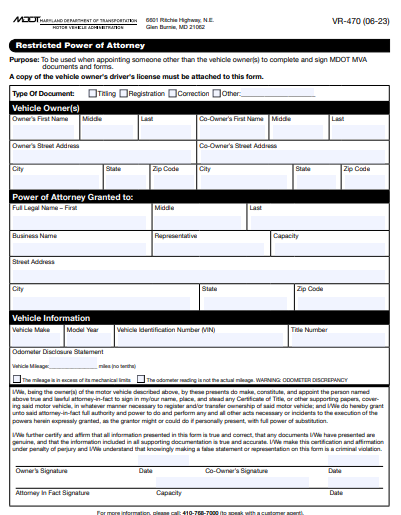
2. Maryland Vehicle Power of Attorney Form
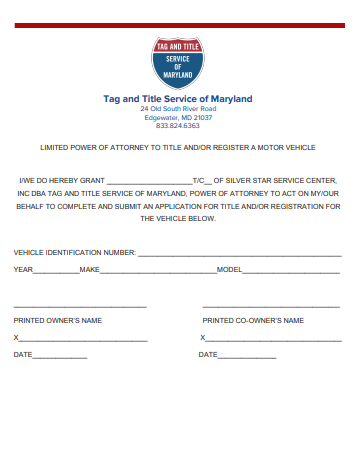
3. Maryland Statutory Power of Attorney Form
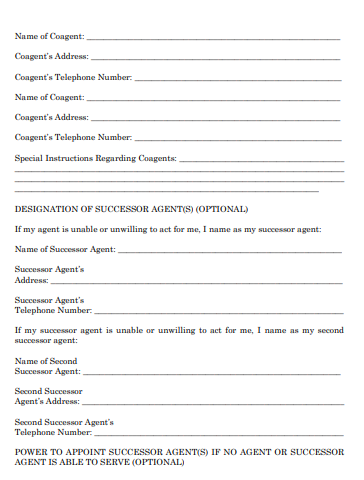
4. Maryland Special Power of Attorney Form
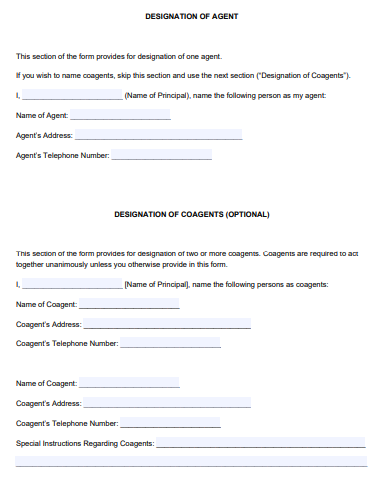
5. Maryland Sample Power of Attorney Form
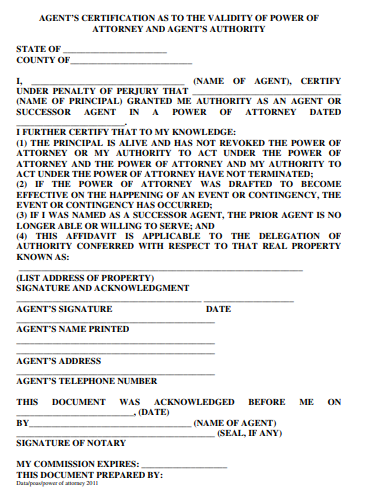
6. Maryland Printable Power of Attorney Form
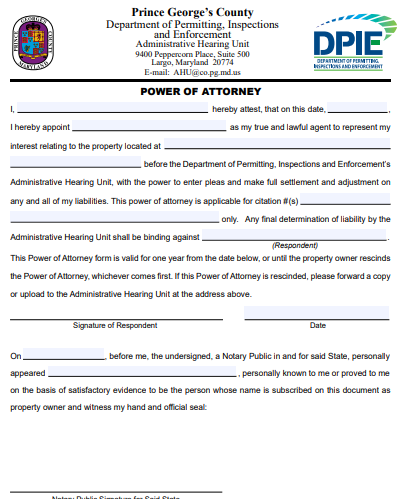
7. Maryland Power of Attorney Form
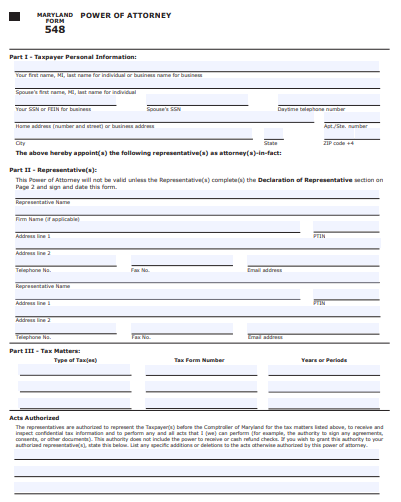
8. Maryland Power of Attorney Authorization Form
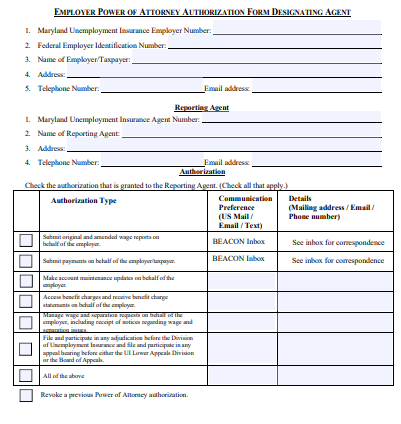
9. Maryland Limited Power of Attorney Form
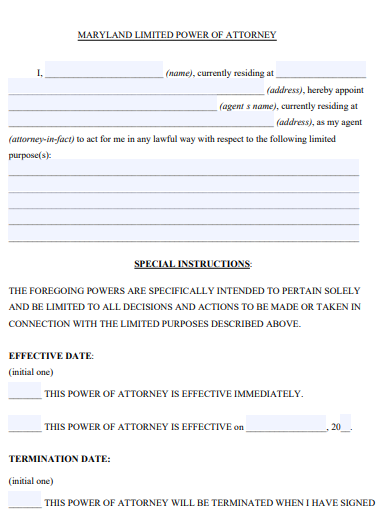
10. Maryland Durable Power of Attorney Form
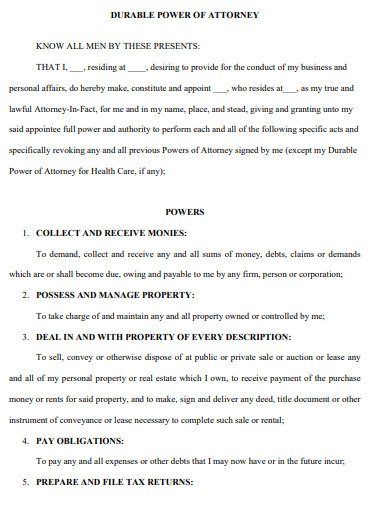
11. Maryland Blank Power of Attorney Form
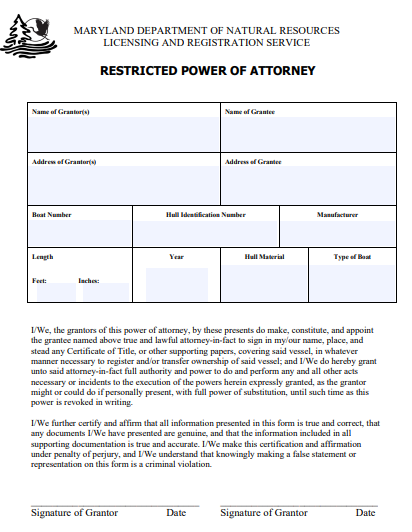
How do I get power of attorney in MD?
1. Understand Maryland’s POA Laws
Research Maryland’s specific legal requirements for a Power of Attorney. Understanding these laws is crucial to ensure compliance and validity.
2. Choose an Agent
Select a trustworthy individual to act as your agent. This person should be reliable and capable of handling your affairs.
3. Draft the POA Document
Create a POA document that specifies the powers granted. Use a state-specific template or consult a legal professional.
4. Sign and Witness
Sign the document in the presence of witnesses. Maryland law may require a specific number of witnesses.
5. Notarization
Get the document notarized to enhance its legal standing. While not always required, notarization is generally recommended.
What is Maryland Form 548?
1. Tax Credit Application
Form 548 is an application for Maryland’s Homeowners’ Property Tax Credit. It helps homeowners with property tax reductions.
2. Eligibility Criteria
Understand the eligibility criteria for applying, which includes income limits and property value assessments.
3. Filing Deadline
Note the annual deadline for filing Form 548 to ensure timely submission and avoid missing out on potential tax credits.
4. Required Documentation
Gather necessary documentation such as proof of income and property tax bills to accompany the form.
5. Application Process
Complete the form with accurate information and submit it to the Maryland State Department of Assessments and Taxation.
How to get power of attorney in Maryland for elderly parent?
1. Discuss with Your Parent
Have an open conversation with your parent about the need for a Power of Attorney and their preferences.
2. Determine the Type of POA
Decide whether a financial, healthcare, or general POA is needed, based on your parent’s requirements.
3. Draft the POA Document
Prepare a POA document that clearly outlines the powers granted. Use a template or seek legal advice for drafting.
4. Ensure Voluntary Participation
Make sure your parent voluntarily agrees to the POA and understands its implications.
5. Legal Formalities
Complete legal formalities like signing, witnessing, and notarization as per Maryland law.
Does a POA need to be notarized in MD?
1. Legal Requirement for Notarization
In Maryland, notarization is a legal requirement for a Power of Attorney (POA) to be valid. This process ensures the authenticity of the signatures and the identities of the parties involved.
2. Protection Against Fraud
Notarization provides a layer of protection against fraud, confirming that the Principal has willingly signed the document in the presence of a notary.
3. State Law Compliance
Under Maryland law, a notarized POA is essential to comply with state regulations, ensuring the document’s legal standing.
4. Ease of Acceptance
A notarized POA is more readily accepted by financial institutions and other entities, as it carries a legal certification of authenticity.
5. Avoiding Legal Disputes
Notarization can help prevent future legal disputes over the validity of the POA, providing a clear record of the signing.
Does Power of Attorney Need to Be Notarized in MD?
1. Real Estate Transactions
In Maryland, for a Power of Attorney (POA) to be used in real estate transactions, it must be notarized. This legal formality ensures the document’s validity, providing a secure way to handle property affairs.
2. Financial Institutions’ Requirements
Banks and other financial institutions in Maryland often require a notarized POA. Notarization adds a layer of authenticity, making financial transactions smoother and legally compliant.
3. Healthcare Decisions
For a Healthcare POA in Maryland, notarization is crucial. It confirms the signer’s identity and intent, ensuring that healthcare decisions are respected and legally recognized.
4. Legal Disputes
In legal disputes, a notarized POA in Maryland holds more weight. It provides clear evidence of the principal’s intentions, reducing the risk of legal challenges.
5. Out-of-State Matters
If a Maryland POA is to be used in another state, notarization can be essential. It helps in meeting the legal requirements of other jurisdictions, ensuring the POA’s acceptance.
How Do I Get Power of Attorney After a Death in Maryland?
1. Estate Executor Role
After a death in Maryland, the role of Power of Attorney ceases. The estate executor, appointed in the will, takes over to manage the deceased’s affairs, following legal protocols.
2. Probate Process
In Maryland, the probate process begins after death. It involves validating the will and administering the estate, a task beyond the scope of a POA.
3. Trust Administration
If the deceased had a trust, a successor trustee, not a POA, manages the trust assets. This process is separate from the POA and follows the trust’s guidelines.
4. Absence of a Will
In cases without a will, Maryland law dictates estate distribution. A court-appointed administrator, not a POA, handles the estate, ensuring legal compliance.
5. Legal Consultation
Seeking legal advice is crucial in Maryland for understanding post-death procedures. A lawyer can guide on estate matters, clarifying the role of POA and other legal entities.
Who Can Override a Power of Attorney Maryland?
1. The Principal’s Revocation
In Maryland, the principal can override their own Power of Attorney. This revocation must be in writing and communicated to all relevant parties.
2. Court Intervention
A Maryland court can override a POA if it’s deemed necessary for the principal’s welfare. This usually occurs in cases of abuse or neglect.
3. Successor Agents
If the POA document specifies, a successor agent in Maryland can override the current agent’s decisions, ensuring the principal’s best interests are maintained.
4. Co-Agents’ Decisions
In Maryland, if co-agents are appointed, they can collectively override decisions made by a single agent, promoting balanced decision-making.
5. Expiration of POA
Some POAs in Maryland have a set expiration date. Upon reaching this date, the POA’s authority is automatically overridden, ceasing its legal power.
How to Prepare a Maryland Power of Attorney Form
Understanding the Purpose
Before drafting a Maryland Power of Attorney (POA) form, understand its purpose. This legal document allows you to appoint someone to make decisions on your behalf. It’s crucial in situations where you might not be able to make decisions yourself.
Choosing the Right Agent
Select a trusted individual as your agent. This person should be responsible, trustworthy, and have a good understanding of your wishes. Consider their ability to make tough decisions under pressure.
Decide the POA Type
Maryland offers various types of POA forms, including General, Limited, Medical, and Durable POA. Choose one that best suits your needs. A Durable POA, for instance, remains effective even if you become incapacitated.
Drafting the Document
You can use a template or seek legal assistance to draft your Maryland POA. Ensure it includes your name, the agent’s name, the powers granted, and the conditions under which it becomes effective.
Include Specific Powers
Be clear about what powers you are granting. You can allow your agent to handle financial matters, make healthcare decisions, or manage real estate, depending on the POA type.
Sign in the Presence of a Notary
In Maryland, most POA forms need to be signed in the presence of a notary public. This step is crucial for the document’s legality.
Store the Document Safely
Once notarized, store your POA document in a safe place. Inform your agent where it is kept and consider giving copies to relevant parties, like your lawyer or family members.
Tips for Using Effective Maryland Power of Attorney Form
Understand the Types of Power of Attorney
Before drafting a Maryland Power of Attorney (POA) form, it’s crucial to understand the different types available. There are General POAs for broad authority, Limited POAs for specific tasks, and Healthcare POAs for medical decisions. Knowing which type suits your needs is the first step in effective communication.
Choose the Right Agent
Selecting a trustworthy and competent agent is vital. This person will act on your behalf, so ensure they understand your wishes and are capable of making decisions in your best interest. Clear communication about your expectations and their responsibilities is key.
Be Specific in Your Instructions
Clarity is essential in a Maryland POA form. Specify the powers you are granting, including financial, legal, or healthcare decisions. Detailed instructions prevent misunderstandings and ensure your agent acts according to your wishes.
Discuss with Family Members
Openly discussing your POA with family members can prevent conflicts and misunderstandings later. It’s important that your loved ones understand your choices and the reasons behind them. This fosters a supportive environment and ensures everyone is on the same page.
Consult with a Legal Professional
Seeking advice from a legal professional experienced in Maryland law can be invaluable. They can help draft a POA that accurately reflects your wishes and adheres to state laws. This step ensures that your document is valid and enforceable.
Regularly Review and Update Your POA
Circumstances change, and so might your POA needs. Regularly reviewing and updating your POA ensures it remains relevant and effective. Communicate any changes to your agent and family to keep them informed.
Notarize and Witness Your POA
In Maryland, notarizing and witnessing your POA adds a layer of legal validity and helps prevent future disputes. Ensure your document meets all state requirements for notarization and witnesses.
Keep Your POA Accessible
Once your POA is finalized, keep it in a safe but accessible place. Inform your agent and a trusted family member or friend of its location. Quick access to the document is crucial in emergencies.
Educate Your Agent
Ensure your chosen agent understands their role and responsibilities. Provide them with resources or encourage them to seek legal advice for a better understanding of their duties under Maryland law.
Prepare for Incapacity
If the POA is for healthcare decisions, discuss your medical preferences in detail with your agent. Consider scenarios like long-term care or life-sustaining treatment. Clear communication about your healthcare wishes is essential for effective decision-making.
By following these tips, you can ensure that your Maryland Power of Attorney form is a robust tool for effective communication, safeguarding your interests and wishes.
When Does My Maryland POA Go into Effect?
Your Maryland Power of Attorney (POA) becomes effective as specified in the document, either immediately or upon a certain event, like incapacitation.
When Does My Maryland POA End?
Your Maryland POA ends upon your death, revocation, or as stated in the POA document, such as at a specific date or event.
Do I Have to Pay My Agent for Responsibilities Described in My POA?
Paying your agent for their responsibilities under your POA is not mandatory in Maryland, but you can choose to compensate them.
Can the Attorney General’s Office Give Me Legal Advice?
The Attorney General’s Office cannot provide personal legal advice to individuals; it’s recommended to consult a private attorney.
Can the Attorney General Help Me Prepare a Financial or Limited Power of Attorney Form?
The Attorney General’s Office does not assist in preparing individual Financial or Limited Power of Attorney forms.
Where Can I File a Complaint Against a Judge?
Complaints against a judge can be filed with the Maryland Commission on Judicial Disabilities for review and appropriate action.
Crafting a Maryland Power of Attorney Form requires attention to detail and adherence to state-specific guidelines. This guide offers essential tips to ensure your document is legally binding and reflects your intentions accurately. Remember, consulting with a legal expert can provide additional clarity and security. Empower your future decisions confidently with a well-prepared Maryland Power of Attorney Form.
Related Posts
-
10+ Free New Hampshire (NH) Power of Attorney Form Download – How to Create Guide, Tips
-
10+ Free Nevada (NV) Power of Attorney Form Download – How to Create Guide, Tips
-
10+ Free Nebraska (NE) Power of Attorney Form Download – How to Create Guide, Tips
-
10+ Free Montana (MT) Power of Attorney Form Download – How to Create Guide, Tips
-
10+ Free Missouri (MO) Power of Attorney Form Download – How to Create Guide, Tips
-
10+ Free Minnesota (MN) Power of Attorney Form Download – How to Create Guide, Tips
-
10+ Free Mississippi (MS) Power of Attorney Form Download – How to Create Guide, Tips
-
10+ Free Massachusetts (MA) Power of Attorney Form Download – How to Create Guide, Tips
-
10+ Free Maine (ME) Power of Attorney Form Download – How to Create Guide, Tips
-
10+ Free Louisiana (LA) Power of Attorney Form Download – How to Create Guide, Tips
-
10+ Free Kentucky (KY) Power of Attorney Form Download – How to Create Guide, Tips
-
10+ Free Kansas (KS) Power of Attorney Form Download – How to Create Guide, Tips
-
10+ Free Iowa (IA) Power of Attorney Form Download – How to Create Guide, Tips
-
10+ Free Indiana (IN) Power of Attorney Form Download – How to Create Guide, Tips
-
10+ Free Illinois (IL) Power of Attorney Form Download – How to Create Guide, Tips
